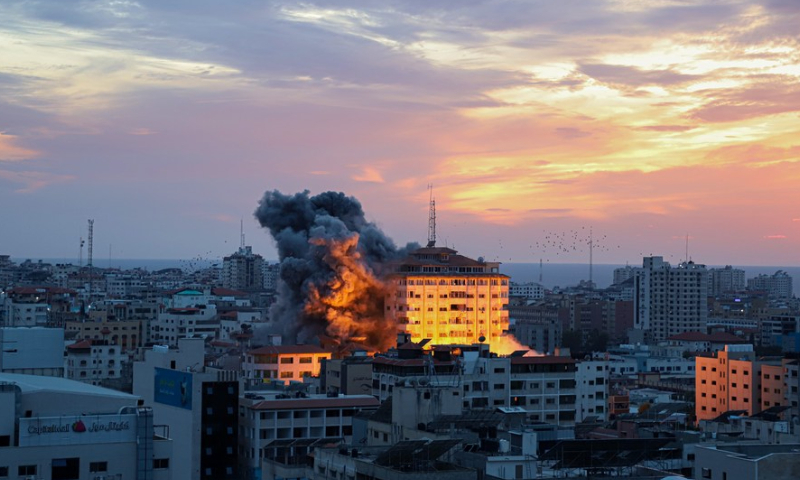To avoid a new Middle East war, Israeli-Palestinian issue can't be delayed: Global Times editorial

Many people say that this round of Israeli-Palestinian conflict erupted quite suddenly, and on the surface, it does seem so. Hamas launched a surprise attack on the Israel's military, catching them off guard and resulting in significant casualties that have shocked the world. Israel's retaliatory actions are bound to lead to more bloodshed and escalation of violence. Even though none of us want to see this happen, it is difficult to prevent it from occurring. International peace efforts are far from strong enough in the face of the Israeli-Palestinian conflict. This is an unavoidable fact and requires a more powerful collective effort from the international community to change it.
From a deeper perspective, this conflict is not sudden and has a certain inevitability. It once again announces to the world, through bloodshed and loss of life, that if fundamental solutions are not implemented for the Palestinian issue, and if the peace process is not promoted, bloodshed and conflict will recur. This is actually quite evident, but it has long been ignored by Western countries that bear the primary responsibility and influence in the Palestinian issue.
For many years, China has repeatedly called on the international community to prioritize the Palestinian issue on the international agenda on major multilateral occasions such as the United Nations. It has emphasized the need to advance the "two-state solution" with a stronger sense of urgency. Not long ago before the outbreak of this conflict, Permanent Mission of China to the UN was still stressing this point. Now, the necessity and urgency have been elevated to another level, given the high cost paid by Palestine, Israel, and the entire Middle East.
It's necessary to recognize that the Israeli-Palestinian issue is a complex conglomerate of problems, and external interference is one of the main reasons why this problem has not been resolved and even intensifies hatred. The bias and interference by Western countries, led by the US, in the Israeli-Palestinian issue have been evident for a long time, and historical Middle East conflicts have often had US involvement behind the scenes. And after the escalation of the Israeli-Palestinian conflict, the quick decision of the US and some Western countries to take sides not only does not help solve the problem but also adds fuel to the fire. Considering the large number of innocent civilians killed and injured in the conflict over the past two days, the immediate priority of the international community should be to urge both sides to cease fire quickly in order to prevent further humanitarian disasters.
A report from the United Nations Conference on Trade and Development shows that the prolonged closure and military operations carried out by Israel during the occupation of Gaza from 2007 to 2018 have pushed Gaza's economy to the brink of collapse. Today, it has become one of the poorest and most volatile areas in the world. It can be said that this large-scale armed conflict between Palestine and Israel once again proves that the means of seeking absolute security, under the guise of peace by the US and the West, cannot achieve true peace and tranquility. It also exposes the essence of the US new Middle East strategy. We urge the US and other Western countries to stop this practice and truly participate in the Middle East peace process.
Middle East peace is by no means a road without a future. The key is to start walking the right path from now on, rather than taking the wrong path or even going back. According to media reports, this round of conflict between Palestine and Israel has already caused nearly 1,000 deaths and thousands of injuries on both sides. Moreover, the war may also spread to other countries. The latest development is that Israel and the armed group Hezbollah in Lebanon have engaged in a firefight. Many people worry whether this event will eventually lead to the "Sixth Middle East War."
At this moment, the international community should take urgent action. The United Nations issued a statement on October 7, calling it a "dangerous precipice," strongly condemning the attacks on civilians, and calling for an end to violence. UN Secretary-General António Guterres urged "all diplomatic efforts to avoid a wider conflagration." The UN Security Council plans to hold a closed-door meeting on the current situation between Palestine and Israel Sunday afternoon local time in New York to discuss solutions. Fundamentally, all parties involved in the Middle East peace process, including Palestine and Israel, must work toward creating conditions for the realization of the "two-state solution."
It has been 50 years since the Fourth Arab-Israeli War (also known as the Yom Kippur War, Ramadan War, October War) and 30 years since the signing of the Oslo Accords. War or peace? The Middle East is once again at a historical crossroads. The international community must take decisive and effective diplomatic actions to urge both sides to stop violence as soon as possible, exercise maximum restraint, and especially prevent the window of opportunity for peace from being closed by conflicts. China has always supported the convening of a larger-scale, more authoritative, and influential international peace conference to create conditions for the resumption of negotiations. This proposal is now more necessary and urgent.